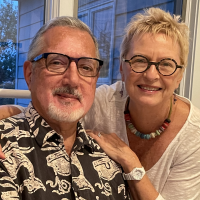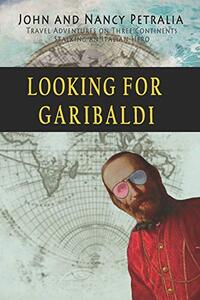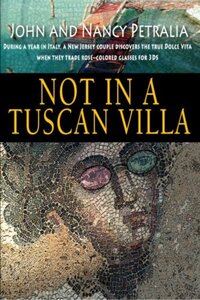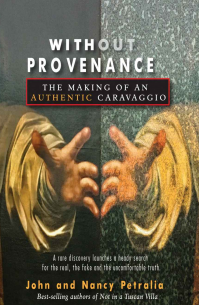Genre:
Biographies & Memoirs- Country: United States
- Books: 3
- Profession: Authors
- Member Since: Jun 2023
- Profile Views: 6,438
- Followers: 136
After living a year in Italy we were encouraged to write a book. To our surprise, Not in a Tuscan Villa became an Amazon bestseller in Travel Italy, snd so our travel writing career began.
We like traveling with a purpose, giving readers not just a travelog of places, but insights about the country, the culture, and the story of why we're there.
We look for the unique and the undiscovered. Whether it's surprising, embarrassing, poignant, or laughable, our readers always say, "I was there with you."
Come share our adventures!
John and Nancy Petralia's Books
Stay in the loop on books by John and Nancy Petralia. See upcoming and best-selling books by the author here. You'll also find the deals on books by John and Nancy Petralia.
** Please note that the information or price displayed here may not be the updated. Make sure to double-check the latest book price before buying books.
** Also, there might be other books by John and Nancy Petralia not listed on AllAuthor.
| Book |
|---|
Looking for Garibaldi: Travels on Three Continents Stalking an Italian Heroby Nancy R PetraliaPublish: Dec 07, 2017Biographies & Memoirs History General Nonfiction |
Not in a Tuscan Villa: During a year in Italy, a New Jersey couple discovers the true Dolce Vita when they trade rose-colored glasses for 3Dsby Donna SudakPublish: Aug 28, 2013Biographies & Memoirs |
Without Provenance: The Making of anby Nancy R PetraliaPublish: Apr 07, 2023Biographies & Memoirs General Nonfiction True Crime |
John and Nancy Petralia Interview On 24, Jan 2024
 "Passionate travel writers, John and Nancy Petralia inspired by a year in Italy, embarked on a travel writing career. Their debut, "Not in a Tuscan Villa," soared as an Amazon bestseller, marking the beginning of a purposeful journey. They seek the unique, undiscovered, and share insightful, sometimes humorous, tales that immerse readers in their adventures."
"Passionate travel writers, John and Nancy Petralia inspired by a year in Italy, embarked on a travel writing career. Their debut, "Not in a Tuscan Villa," soared as an Amazon bestseller, marking the beginning of a purposeful journey. They seek the unique, undiscovered, and share insightful, sometimes humorous, tales that immerse readers in their adventures."
We’ve always been comfortable spending time together. Although we have our own interests, we get the most pleasure out of doing things together or with friends. When we moved to Italy living in a foreign language forced us to rely completely on each other. John, who has better language skills, handled translation and communication while Nancy was responsible for planning and logistics. Example: We might see a flyer for a jazz concert in another city. He would read the details and if necessary, call to make a reservation. She would figure out which trains to take, how we’d get from the station to the event. He would engage people there in conversation and she would document our experience in photos. We pretty much went everywhere as a team, usually hand in hand. When we encountered a problem, we had each other as resource to figure it out. That experience deepened our appreciation for each other. When we left behind our American lives—very full of commitments, fun activities, and friends—we were able to live in the moment, take in La Dolce Vita (sweet life) of the Italians and focus on the pleasure of sharing each day together.
Were there any cultural aspects or traditions in Italy that particularly resonated with you and influenced your perspective?One thing we noticed was how much music is a part of Italian life. Italians love jazz and we heard combos in clubs and weekly concerts in the piazza. Also, orchestras and bands in auditoriums and open air performances. The local band was often marching through town during our months in Conversano. In our adopted hometown, Parma, musicians showed up in Piazza Garibaldi, played along the streets, and performed in festivals. During October the entire town celebrated their native son, Giuseppe Verdi, with music piped in the streets, opera singers performing with local choirs, and free concerts. The famous Parma Opera company put their costumes in all the stores in town—even the butcher shops and hardware stores. Va, pensiero, the Song of the Hebrew Slaves from Verdi’s Nabucco is the unofficial national anthem that every Italian can sing. We’re music fans, particularly jazz and opera. The chance to hear these genre celebrated in public was both a surprise and delight.
Can you tell us more about your journey from living in Italy for a year to becoming a best-selling author in the travel genre? What inspired you to start writing about your experiences?We had no intention of writing a book. But when we returned from our year, we found ourselves sharing many observations with friends who would say, “You should write a book.” So we found a writers’ group at our local library where the participants helped us hone our style. Not in a Tuscan Villa was birthed in that group. To our great surprise, it became a bestseller in its category on Amazon. People enjoy the authentic experience we share—both the good and challenging—and can live vicariously through our two voices.
"Not in a Tuscan Villa" focuses on travel with a purpose. Could you elaborate on the concept of traveling with a purpose and why it's essential to your writing?There’s a famous quote about how the tourist sees what he came to see while the traveler sees what he sees. Our purpose has always been to look beyond the obvious, to see what’s happening around us, and to look for the connections to our own lives and what’s happening in the world. With both Looking for Garibaldi and Without Provenance we started with a goal—exploring the places Garibaldi lived and fought, and then going to where Caravaggio’s paintings are while investigating the art of forgery. But in each, we still looked for the people and happenings that connected back to today.
Your readers appreciate the insights into the country, culture, and the story behind your travels. How do you go about researching and incorporating these elements into your writing?First, we’re curious. Whether in a foreign country or planning an extended stay, we want to know more about the place we’ll stay or visit. We got interested in Giuseppe Garibaldi while living in Italy. Every city, town or village we visited had a statue, bust, or plaque to the Unifier of Italy and it was fun to ask where that was to break the ice with locals and find our way around a new locale. Back home, we read about his life in Italy and South America, the Risorgemento, and his place as the world’s most famous man in 1860. Looking for Garibaldi grew out of that research as well as our visits to all of his homes in Italy, Montevideo Uruguay, and Staten Island. In that book we also tell the stories of other war veterans, both Italian and American and how each country honors their heroes.
Our third book, Without Provenance, originated from an observation of recent news articles about “rediscovered” Caravaggio paintings, as well as those by others, thought to be long lost. We’d always liked his work, but the recent resurgence of interest in him, plus the multimillion dollar prices they were bringing—even for works with no real authentication—peaked that curiosity, about Caravaggio, and the potential of modern forgery. We’d seen his work around Italy but before returning for a more in depth study, we read many books about him, his work, and the art of forgery. Then, we scrutinized more than 60 of his paintings up close before writing.
You mention a preference for uncovering the unique and undiscovered aspects of a destination. Can you share an example of a memorable discovery from one of your travels that made its way into your book?Probably the most unique and unusual place we discovered was the Hypogeum in Malta. The ancient peoples of Malta carved—using stone tools—this series of rooms between 4000 and 2500 BC. More than 7000 people were buried in the chambers. One, which was probably used for religious purposes, sends echoes throughout the others. Swirls of red ochre paint decorate the walls. Another chamber resembles the Megalithic temples found above ground complete with a domed ceiling and pillars. To protect its microclimate and prevent damage only 80 people per day are allowed to visit the site so it was a special privilege to visit.
Travel often leads to unexpected and sometimes amusing situations. Could you share a particularly funny or embarrassing moment from your travels that left an impression on you and your readers?Our books are full of embarrassing moments! One happened while we were visiting Venice during December. Nancy had taken a tumble the day before and her white winter coat was smudged with dirt. We were wandering the back alleys and had gotten separated across a piazza as we looked for a particular street sign. A well-dressed local woman approached Nancy and asked in Italian, “Are you looking for work?” She understood the words, but not the context and was groping for a reply. John, who had heard the query, hurried to her side. “With your dirty coat and blonde hair, she thinks you’re a Russian cleaning woman!” The woman scurried off when she heard our English, but we had a good laugh.
Your book's title, "Not in a Tuscan Villa," is intriguing. Could you tell us the story behind the title and how it encapsulates the essence of your travel experiences?We decided to move to Italy to become fluent. First it was to be for three months, then six, and finally we agreed it should be for a year. That was a big commitment, so to make sure we kept it, we told all our friends, “We’re moving to Italy for a year.” That way we couldn’t back out. One of the first questions that followed our announcement was, “Are you going to live in a Tuscan villa?” Well, no. Not for a year at $5000 per week. Hence, our year spent not in a Tuscan villa. We like to stay in non-touristy locations and live like locals. No fancy hotels, spa resorts, or stays curated by others. By making our own way, sometimes with missteps, our experience has the kind of authenticity our readers love.
Travel writing often involves a balance between personal anecdotes and providing valuable information for travelers. How do you strike this balance in your writing, and what advice would you give to aspiring travel writers in this regard?Our books really are about what happens to us wherever we are. Many of our stories include the challenges we face with logistics, bureaucracy, misunderstanding, and bad timing. But they also include serendipitous discoveries and encounters with locals who became friends. It’s the honest experience that our readers say they love about our books. So our advice would be to write what you experience, not just what you see.
As seasoned travel writers, you must have encountered various cultures and traditions. Is there a particular cultural experience that profoundly impacted you and influenced your writing style?We’re always observing the difference between American culture and Italian. One of the first things we noticed was a young man walking every day with his grandmother. He wasn’t unusual there, but it’s not something you’re likely to see in America. That made us start noticing other things. Americans like to fly the flag. In Italy, you only find the Italian flag on government buildings. The one you see hanging from apartment windows is for the soccer team. As we traveled, we noted who was honored in statues around the country. Italians tend to honor artists, writers, musicians and scientists with statues—Dante, Galileo, Di Vinci, Marconi, as well as more modern ones. Our American statues are mostly to politicians, warriors and sports figures. That last observation says a lot about culture and Nancy wrote about it in our first two books.
Nancy has mentioned about her diverse interests, including singing, making art, dancing, and reading books. How have these passions shaped her personal and professional life?They’re all things I’ve enjoyed since childhood. As a retiree, I discovered I have a talent for sculpture and jewelry making which opened a new kind of confidence. When we travel, I love joining with the locals in dance. I’ve danced with the Catalonians in Barcelona, the villagers in Sardinia, and we took tango lessons in Buenos Aires. John and I started a book club nearly 30 years ago that still meets every month. We’ve read many books I’d never have read otherwise. Through them we explored the world, its history, and walked in the shoes of those we could never know. Reading broadens the perspective and deepens empathy. We try to capture some of those feelings in our own books.
Dear John, in your closing statement, you encourage readers to find their own "Italy" and do something exciting or adventuresome. What advice would you give to someone looking to embark on a new and inspiring journey in their life?Whatever is your daydream, even if it might be hard, just do it. Your life will be much richer from the effort, usually in surprising ways.
What message or message of inspiration would you like to convey to your readers as they dive into your book and explore your journey in "Without Provenance”?Using art as a proxy, the book delves into our current post-truth world—false narratives, alternative facts, lies, and propaganda—we live in today. Ror example, it’s estimated that 50 percent of works of art currently on the market are actually forgeries. In many cases, neither buyer nor seller care about authenticity. In the 16th century, things were not so different. Despite what could only be characterized as a decadent life, Caravaggio’s body of religious work was useful to the Catholic Church’s fight against the Reformation. So they turned a blind eye to their own morals.
What's next for you as authors? Do you have any upcoming projects or writing endeavors that you'd like to share with your readers?We’re taking a break now. For the first time in ten years we took a two month trip and spent six weeks in Italy—without the need to write about it. So relaxing! The best part was catching up with all the friends we made there while writing our three books. We love speaking to groups about Italy, our travels, Garibaldi, Caravaggio, and the path of our Italian journey. It’s great fun for us and an easy way to share our experiences with others.
Finally, how has your time with AllAuthor impacted your life and your writing so far? What other measures could be taken on this site to cater better to the needs of the authors?Making attractive posts and ads for Facebook has always been a chore. The AllAuthor options have made that super easy and saved us loads of time. Also like the posts on X.
Only thing I could suggest is to vet some folks who can help create ads for Facebook. Trying to find good and reliable contractors and vendors is a huge challenge. The Facebook platform keeps changing and (even by the admission of their marketing folks) makes it harder and more confusing for customers. I’m sure others would find this service helpful as well.
Ask John and Nancy Petralia a Question
Have brimming questions to ask author John and Nancy Petralia? Ask whatever you like, but keep it appropriate.
** Please note that unanswered questions will not appear on the page. Refrain from posting promotional messages.




